Related Research Articles

Columbia University, officially Columbia University in the City of New York, is a private Ivy League research university in New York City. Established in 1754 as King's College on the grounds of Trinity Church in Manhattan, it is the oldest institution of higher education in New York and the fifth-oldest in the United States.
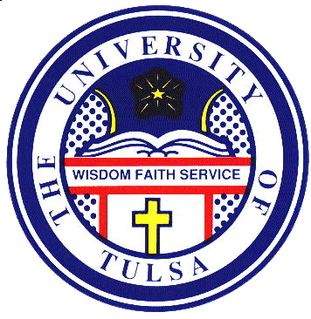
The University of Tulsa (TU) is a private research university in Tulsa, Oklahoma. It has a historic affiliation with the Presbyterian Church, although it is now nondenominational, and the campus architectural style is predominantly Collegiate Gothic. The school traces its origin to the Presbyterian School for Indian Girls, which was established in 1882 in Muskogee, Oklahoma, then a town in Indian Territory, and which evolved into an institution of higher education named Henry Kendall College by 1894. The college moved to Tulsa, another town in the Creek Nation in 1904, before the state of Oklahoma was created. In 1920, Kendall College was renamed the University of Tulsa.

Lawrence Henry Summers is an American economist who served as the 71st United States Secretary of the Treasury from 1999 to 2001 and as director of the National Economic Council from 2009 to 2010. He also served as president of Harvard University from 2001 to 2006, where he is the Charles W. Eliot University Professor and director of the Mossavar-Rahmani Center for Business and Government at Harvard Kennedy School. In November 2023, Summers joined the board of directors of artificial general intelligence company OpenAI.

The Hoover Institution is an American public policy think tank which promotes personal and economic liberty, free enterprise, and limited government. While the institution is formally a unit of Stanford University, it maintains an independent board of overseers and relies on its own income and donations. It is widely described as conservative, although its directors have contested the idea that it is partisan.

Mark Odom Hatfield was an American politician and educator from the state of Oregon. A Republican, he served eight years as Governor of Oregon, followed by 30 years as one of its United States senators, including time as chairman of the Senate Appropriations Committee. A native Oregonian, he served in the United States Navy in the Pacific Theater during World War II after graduating from Willamette University. After the war he earned a graduate degree from Stanford University before returning to Oregon and Willamette as a professor.

Baruch College is a public college in New York City, United States. It is a constituent college of the City University of New York system. Named for financier and statesman Bernard M. Baruch, the college operates undergraduate and postgraduate programs through the Zicklin School of Business, the Weissman School of Arts and Sciences, and the Marxe School of Public and International Affairs.
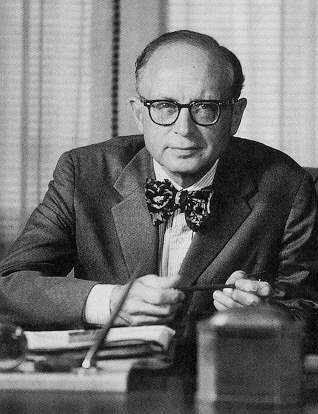
Daniel Joseph Boorstin was an American historian at the University of Chicago who wrote on many topics in American and world history. He was appointed the twelfth Librarian of the United States Congress in 1975 and served until 1987. He was instrumental in the creation of the Center for the Book at the Library of Congress.

James Hadley Billington was an American academic and author who taught history at Harvard and Princeton before serving for 42 years as CEO of four federal cultural institutions. He served as the 13th Librarian of Congress after being nominated by President Ronald Reagan in 1987, and his appointment was approved unanimously by the U.S. Senate. He retired as Librarian on September 30, 2015.

Adelphi University is a private university in Garden City, New York. Adelphi also has centers in Downtown Brooklyn, Hudson Valley, and Suffolk County in addition to a virtual, online campus for remote students. It is the oldest institution of higher education in suburban Long Island. As of 2019, it had about 7,859 undergraduate and graduate students.
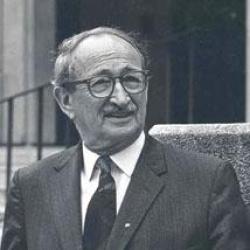
Sidney Hook was an American philosopher of pragmatism known for his contributions to the philosophy of history, the philosophy of education, political theory, and ethics. After embracing communism in his youth, Hook was later known for his criticisms of totalitarianism, both fascism and Marxism–Leninism. A social democrat, Hook sometimes cooperated with conservatives, particularly in opposing Marxism–Leninism. After World War II, he argued that members of such groups as the Communist Party USA and Leninists like democratic centralists could ethically be barred from holding the offices of public trust because they called for the violent overthrow of democratic governments.
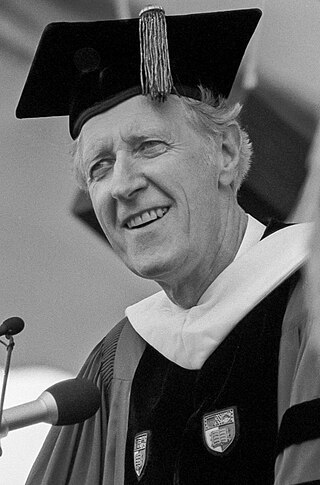
Frank Harold Trevor Rhodes was the ninth president of Cornell University from 1977 to 1995.
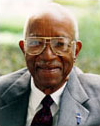
John Hope Franklin was an American historian of the United States and former president of Phi Beta Kappa, the Organization of American Historians, the American Historical Association, and the Southern Historical Association. Franklin is best known for his work From Slavery to Freedom, first published in 1947, and continually updated. More than three million copies have been sold. In 1995, he was awarded the Presidential Medal of Freedom, the nation's highest civilian honor.
Kenneth Guy Lieberthal is an American professor and politician known as an expert on Chinese politics, political economy, domestic and foreign policy, and on the evolution of US-China relations.
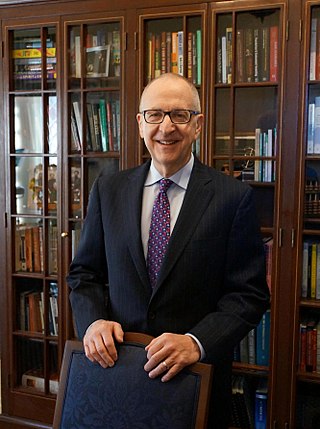
David Jan Skorton is an American physician and academic. He has been president and chief executive officer of the Association of American Medical Colleges (AAMC) since July 15, 2019. Prior to the AAMC, he led the Smithsonian Institution, as its 13th Secretary from July 2015 to June 2019. A cardiologist, he was president of Cornell University from 2006 to 2015. Before arriving at Cornell, he served as president of the University of Iowa, where he had been a longtime professor and then vice president. He began his career as a professor of medicine and engineering. He was the first physician to serve as president of the Smithsonian Institution.

David W. Leebron is an American legal scholar who served as the 7th President of Rice University from 2004 to 2022. He was a professor and dean of Columbia Law School, until he was named president of Rice University on July 1, 2004. In 2024, he was named the new president and CEO of Texas 2036.
Steven Edward Hyman is Director of the Stanley Center for Psychiatric Research at the Broad Institute of MIT and Harvard in Cambridge, Massachusetts. He is also Harvard University Distinguished Service Professor of Stem Cell and Regenerative Biology. Hyman was Provost of Harvard University from 2001 to 2011 and before that Director of the U.S. National Institute of Mental Health (NIMH) from 1996 to 2001. Hyman received the 2016 Rhoda and Bernard Sarnat International Prize in Mental Health from the National Academy of Medicine for "leadership in furthering understanding and treatment of psychiatric disorders as biological diseases".
Robert William Lawless was an American academic and executive. He served as president of Texas Tech University from 1989 to 1996 and president of the University of Tulsa from 1996 to 2004. He held a Bachelor of Science degree (1964) from the University of Houston and a Doctor of Philosophy degree (1968) from Texas A&M University in operations research. Lawless also served as executive vice president and chief operations officer of Southwest Airlines from 1985 to 1989, after serving in various positions with the airline, including vice president for finance and chief financial officer.

J. Timothy Cloyd is an American educator and former higher education administrator. Cloyd served as the president of Hendrix College in Conway, Arkansas from 2001 to 2013. In 2016, he became president of Drury University in Springfield, Missouri, a position he held until his resignation in March of 2023.
References
- ↑ "Khrushchev's son to speak at TU forum". The Tulsa World. October 16, 2005. Retrieved August 11, 2011.
- ↑ "Resident Members". Archived from the original on 2011-10-02. Retrieved 2011-08-11.
- ↑ "University of Tulsa President Plans to Step Down Next Year". The Journal Record. June 8, 1995. Retrieved August 10, 2011.[ dead link ]
- ↑ "University of Tulsa President to Resign". The Oklahoman. June 8, 1995. Retrieved August 9, 2011.
- ↑ "Robert H. Donaldson: Trustees Professor of Political Science Emeritus, University of Tulsa". Tulsa Committee on Foreign Relations. Retrieved March 16, 2023.